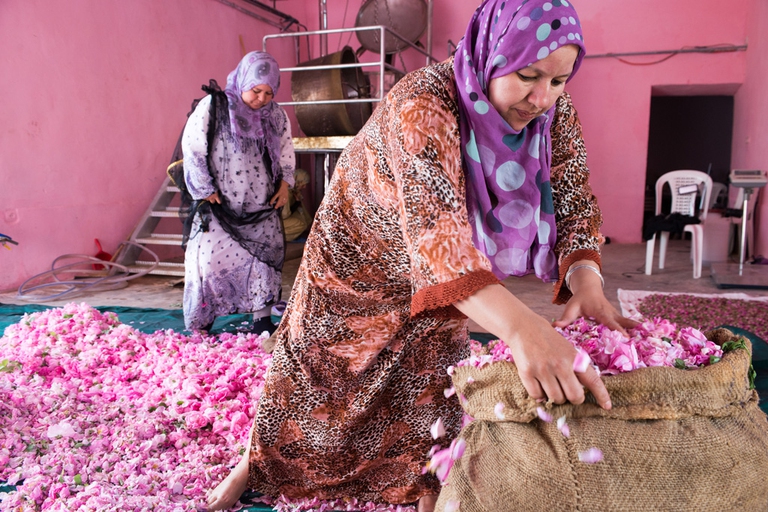
Kalongo Hospital in Uganda is on high alert. Medics are facing the pandemic amid an already precarious healthcare situation, in a country with only 55 intensive care beds.
A project aimed to rediscover the importance of roses in Morocco created an opportunity for development and women’s empowerment, and repopulated a valley that would otherwise be abandoned.
In the valley of the Dadès River, Morocco, centifolia roses have always been very important for the population, but over the course of the years the price of fresh flowers has dropped and sales have increasingly gone down. So, these plants were disappearing when Naïma Fdil, who was born in a small village in this valley of roses, had an intuition.
When she had been studying in Marrakesh, Fdil found out that the roses of her valley, thanks to the semi-arid climate of the region and the nutrient-rich soil, have unique properties that make them suitable for the production of cosmetics. In 2005 Fdil founded the Women’s Association for Family Development in Wadi Dadès aiming to provide women in the villages with the resources that meet their and their children’s needs.
The association taught these women how to distill roses in order to obtain more precious products that can be sold at higher prices, and opened a distillery where bio cosmetics are made. To make the project sustainable she also planted new roses in nurseries as well as open fields and taught women how to take care of them. This also helped preserve the biodiversity of the region and strengthen the slopes of the valley, avoiding landslides when it rains.
Serious attention has been paid in the growth project that allowed women to learn the bases of mathematics and Arabic – they only spoke the local dialect; a nursery school has also been opened where children can learn French and Arabic before going to primary school and a school bus has been purchased to take elder students to school.
The association offered these women awareness and a new vision to the present and future, and made them stronger and freer. “I’m very proud because the women of my village and other surrounding villages understood that the Earth is the solution to their financial and social problems. I could have been one of them and live the life of a country woman: without voice, without rights and without resources”, Fdil said. This development programme expanded the economy of the valley and provided local women with an opportunity to eradicate poverty and illiteracy.
In 2013 the Yves Rocher Foundation recognised the merit of this project and awarded the Terre de femmes Prize to Naïma Fdil because she knew how to combine environmental protection, local economic development and women’s empowerment. Now she’s satisfied: “When a woman dreams something she just needs to take the first step. And she will go through it”.
Siamo anche su WhatsApp. Segui il canale ufficiale LifeGate per restare aggiornata, aggiornato sulle ultime notizie e sulle nostre attività.
![]()
Quest'opera è distribuita con Licenza Creative Commons Attribuzione - Non commerciale - Non opere derivate 4.0 Internazionale.
Kalongo Hospital in Uganda is on high alert. Medics are facing the pandemic amid an already precarious healthcare situation, in a country with only 55 intensive care beds.
Indigenous peoples in the isolated region are suffering from poor access to health, with several cities becoming hotspots of coronavirus in the Amazon. Indigenous leaders, health experts and NGOs are calling for international help.
The government believes it’s on the right track to addressing the coronavirus in Bangladesh. But millions don’t have enough food and as most hospitals refuse patients with a fever and cough, the poor are dying.
The coronavirus in Africa could completely overwhelm healthcare systems neglected for years. Yet Zambia has refrained from imposing the type of far-reaching lockdown seen in nations such as South Africa.
The city of Guayaquil in Ecuador has become the coronavirus epicentre in Latin America, offering a dire warning of what could happen throughout the region. People are dying so fast that bodies are left in their homes, or in the streets, for days.
These days her phone hasn’t stopped ringing but Ilaria Capua continues sharing her knowledge to spread information about the novel coronavirus. In this interview she highlights the importance of sustainability.
The consequences of the novel coronavirus or Covid-19: what are the symptoms, what the death toll is, whether there’re a cure, how China has been affected. And why it’s been labelled an emergency also in economic terms.
Natural remedies can be very helpful when it comes to not feeling cold in winter: here are some ways to keep the body warm, at home and outdoors, including what to eat to increase body heat.
The kambo medicine uses the secretion of the green tree frog. We speak to Tanja Lucev, who organises kambo retreats in Guatemala, about the benefits of the traditional shamanic experience.








